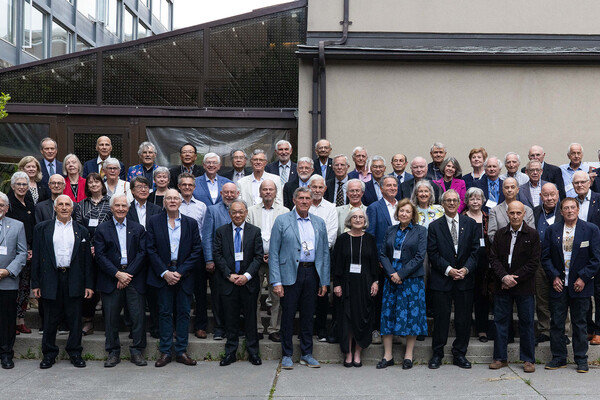Mobile Menu
- Education
- Research
-
Students
- High School Outreach
- Undergraduate & Beyond: Community of Support
- Current Students
- Faculty & Staff
- Alumni
- News & Events
- Giving
- About

This September 17 will mark the one-year anniversary of Stephanie Fauquier crossing the finish line of her 10th triathlon in less than five months – capping off her ambitious Race with Steph campaign to raise awareness of and funds for Alzheimer’s research at U of T’s Tanz Centre for Research in Neurodegenerative Diseases.
From May to September 2023, Fauquier swam, cycled and ran a total of more than 500 kms in triathlon events in every Canadian province. The effort was dedicated to her mother, the late Robin McLeod (PGME ’81), an internationally renowned surgical expert who served as a professor of general surgery at the University of Toronto and as a surgeon and senior investigator at Mount Sinai Hospital.
McLeod had been diagnosed with Alzheimer’s disease two years prior.
“It was the most devastating news of my life,” remembered Steph in a 2023 interview with Temerty Medicine. “There is no cure for Alzheimer’s. It strips you of your identity, your dignity and your autonomy.”

McLeod, who was present when Steph crossed the finish line of her tenth race in Niagara Falls, sadly died in February 2024. Yet, her memory and legacy of championing health science will live on forever at U of T in the form of the Dr. Robin McLeod Research Scholarship, which was established with funds raised via the Race with Steph Campaign.
As an endowed award, the McLeod Scholarship will support graduate students training in U of T’s Tanz Centre for Neurodegenerative Disease Research in perpetuity, and will have a particular focus on supporting trainees working on Alzheimer’s related projects.
“This is such a fitting and lasting tribute to my mum’s lifelong commitment to supporting learners and advancing science,” says Steph.
Thomas Zerbes: Exploring Potential Future Treatments for Prion and other Neurodegenerative Diseases
The inaugural recipient of the Dr. Robin McLeod Research Scholarship is Thomas Zerbes, a doctoral candidate studying at the Tanz Centre for Research in Neurodegenerative Diseases under the supervision of Professor Gerold Schmitt-Ulms.
Zerbes is working to develop a gene therapy for prion diseases – rare, degenerative brain disorders caused by a deviant form of the prion protein found in the brain. These abnormal prions can infect their healthy counterparts, causing a cascade that eventually leads to severe neurological damage.
Zerbes’s goal is to develop a gene therapy to alter the levels of the prion protein, ultimately prolonging and improving the quality of patients’ lives.

Studying prion diseases can also help us understand Alzheimer’s disease, explains Zerbes. Prion diseases are classified as proteinopathies, conditions where key proteins in the body take on an abnormal form. Alzheimer’s disease, Parkinson’s disease and amyotrophic lateral sclerosis (ALS) are also classified as proteinopathies.
“There are a lot of similarities between prion disease and Alzheimer's,” says Zerbes. “The main driver of these diseases seems to be a conversion of certain healthy proteins to toxic forms that then contribute to brain damage.”
Prion diseases gained mainstream notoriety in the 1990s, when an outbreak of Bovine spongiform encephalopathy (also known as mad cow disease) in the UK’s meat industry spread to humans. A total of 178 people have been recorded to have died from the condition, referred to as variant Creutzfeldt–Jakob disease (vCJD) once it is transmitted to humans. Symptoms of vCJD include depression, anxiety and a burning pins and needles sensation in the extremities, rapidly progressing to dementia and invariable death.
Both Alzheimer’s and prion diseases share similar barriers to delivering preventative treatments to at-risk brain cells. Any medication will have to be able to pass the blood-brain barrier, a filtration system that protects the brain from unknown molecules.
The ability to get a treatment to pass the blood-brain barrier and achieve brain-wide delivery of the therapy is still limited. It is influenced by a vast variety of different factors that make it challenging to choose the right combination of elements, which is also part of Zerbes' work.
“I am hoping to contribute my part to the rapidly evolving field of gene therapies that could one day help a lot of people – those who are at risk of prion disease, Alzheimer’s, or another condition,” Zerbes says.
In addition to offering much-needed financial support that will allow him to focus on his research, Zerbes notes that the Dr. Robin McLeod Graduate Scholarship is also providing a confidence boost as he continues to embark on his academic career.
“Graduate students have to deal with a lot of self-doubt, especially in the beginning because grad school can be incredibly overwhelming,” Zerbes says. “Getting the reassurance from receiving this award – that I have the skills and ability to make a difference – really means a lot to me. Steph and her family are such kind souls, I’m thankful for having the chance to play a part in in their incredible story.”

